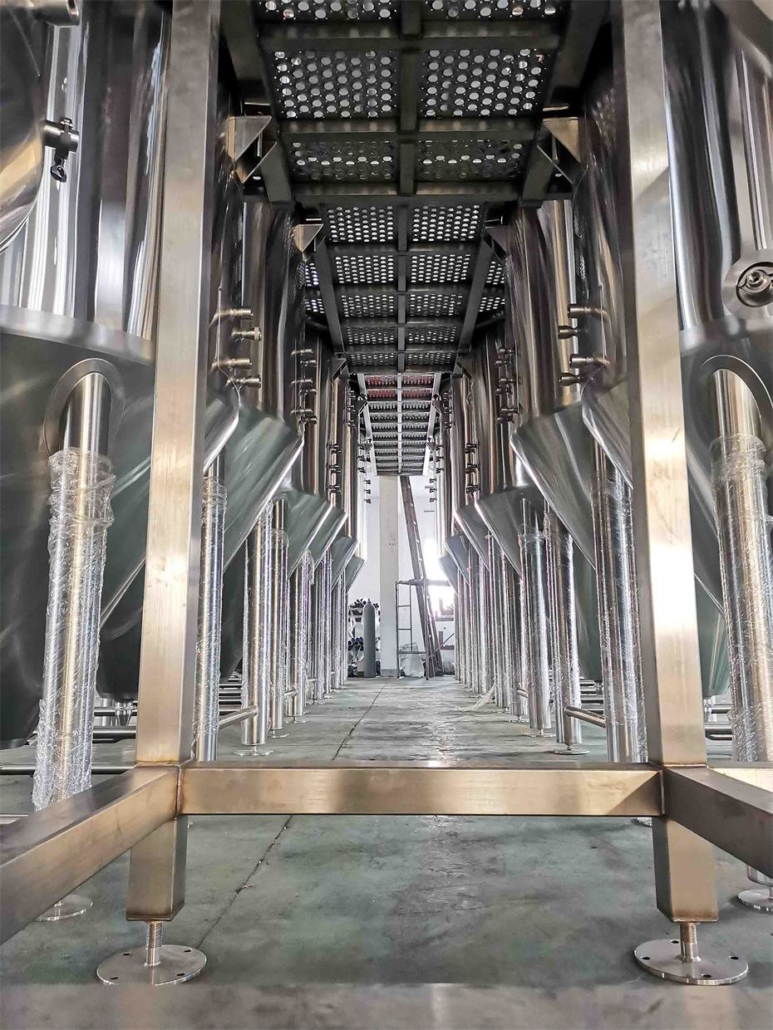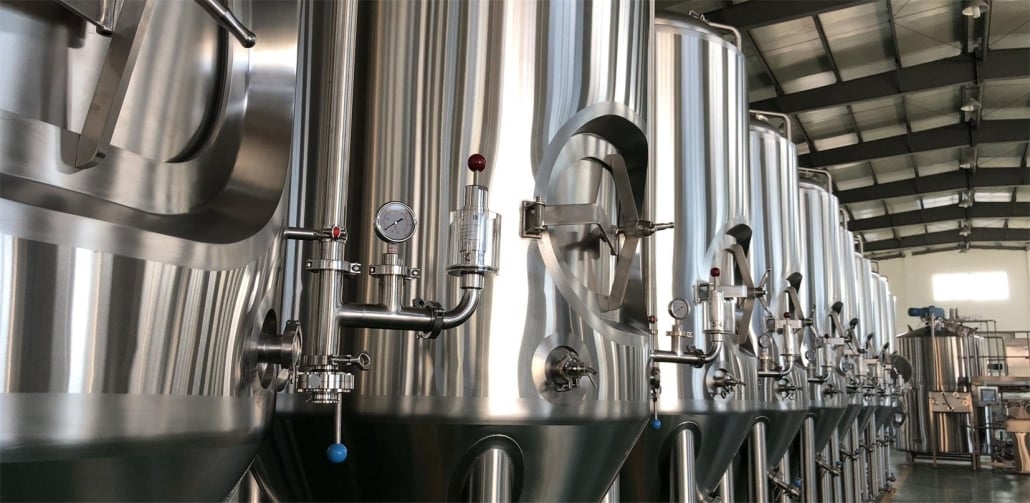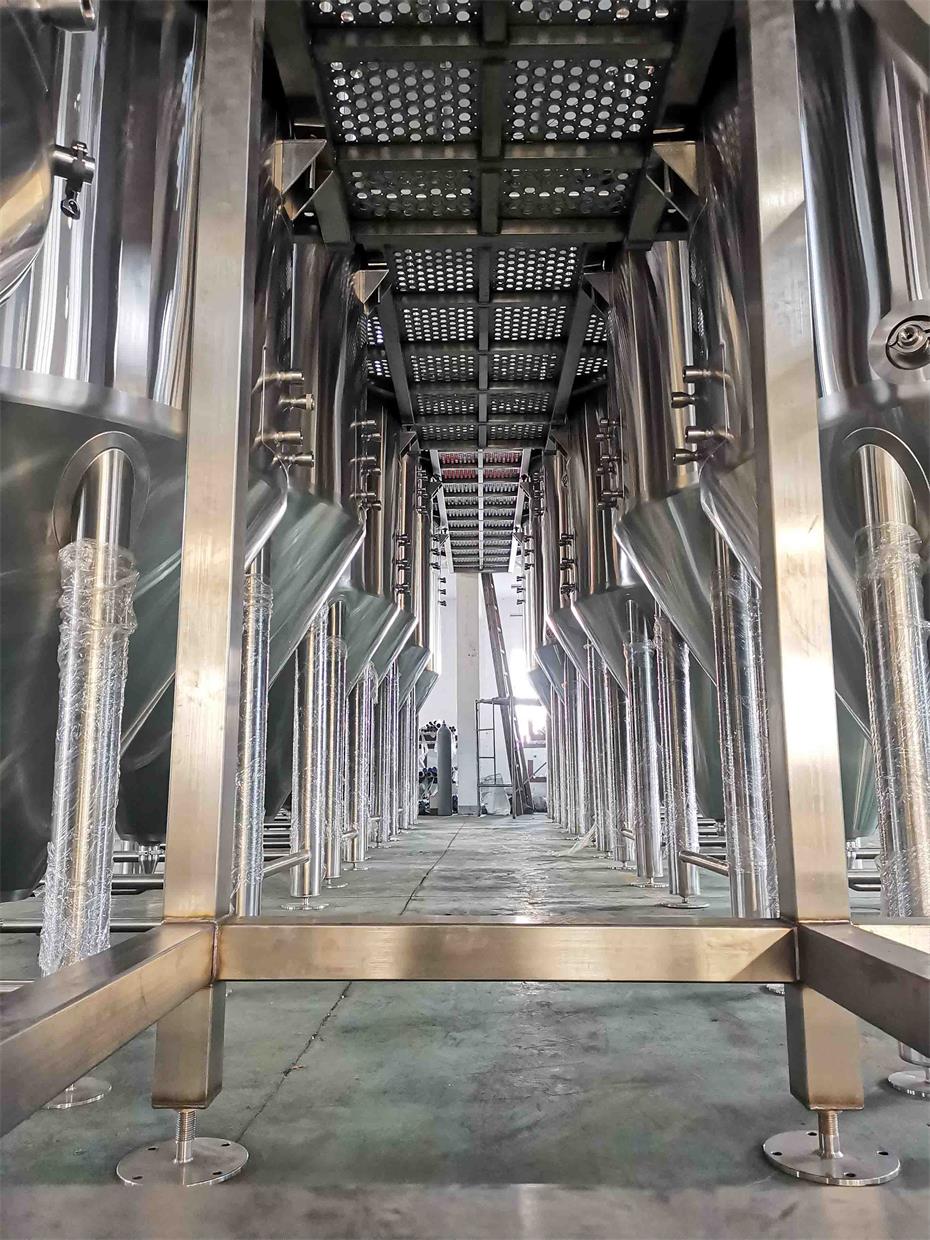100bbl Fermentation Tanks: A Comprehensive Guide
Introduction to 100bbl Fermentation Tanks
Are you a craft brewer or brewery owner looking to scale up your production? If so, investing in a 100bbl fermentation tank might be the perfect solution for you. Fermentation tanks are crucial components in the beer brewing process. In this article, we’ll dive deep into the world of 100bbl fermentation tanks, discussing their features, benefits, and factors to consider when choosing one. So, let’s get started!

The Brewing Process
Before we explore the ins and outs of 100bbl fermentation tanks, it’s essential to understand the beer brewing process. Here’s a brief overview of the steps involved:
Mashing
First and foremost, mashing takes center stage. In this crucial step, brewers mix milled grain with water, creating a mash. Here, enzymes break down starches, turning them into fermentable sugars. Remember, maintaining the right temperature is essential for optimal enzyme activity. Consequently, brewers closely monitor and adjust the heat during this process.
Lautering
Subsequently, lautering comes into play. This process aims to separate the sweet liquid, known as wort, from the spent grain. To achieve this, brewers transfer the mash to a vessel called a lauter tun. Equipped with a false bottom, the lauter tun filters out the grain, leaving behind the wort. Importantly, the wort contains fermentable sugars, which are vital for fermentation.
Boiling
Next up is boiling, a stage that serves multiple purposes. By boiling the wort, brewers sanitize it and break down proteins, preventing haze in the final product. Additionally, they add hops during this stage, which imparts flavor, aroma, and bitterness to the beer. Typically, wort boils for 60 to 90 minutes, depending on the desired characteristics and style of beer.
Fermentation
Finally, the fermentation process begins. Once the wort cools down, brewers add yeast to kick-start fermentation. Yeast metabolizes the fermentable sugars, transforming them into alcohol and carbon dioxide. The fermentation stage is temperature-sensitive, requiring precise control to ensure optimal yeast performance. After fermentation is complete, the beer is ready for aging and conditioning before packaging and consumption.


Types of Fermentation Tanks
There are several types of fermentation tanks used in the brewing industry. Let’s take a closer look at the most common ones:
Conical Fermenters
Starting with conical fermenters, these tanks stand out due to their cone-shaped bottoms. This unique design facilitates yeast collection and removal, making the brewing process more efficient. Furthermore, conical fermenters help separate trub and hop particles from the beer, improving its clarity. As a result, many brewers favor conical fermenters for their ease of use and practical benefits.
Cylindroconical Fermenters
Next, we have cylindroconical fermenters, which combine the advantages of cylindrical and conical tanks. The upper part is cylindrical, while the bottom has a conical shape. Consequently, these fermenters offer excellent fermentation conditions and efficient yeast collection. Additionally, cylindroconical fermenters often have integrated cooling systems, enabling precise temperature control throughout fermentation. Due to these benefits, cylindroconical fermenters are a popular choice in the brewing industry.
Flat Bottom Fermenters
Lastly, flat bottom fermenters offer a more affordable option for brewers on a budget. However, they are less efficient in yeast collection compared to their conical counterparts. Despite this drawback, flat bottom fermenters can still provide satisfactory fermentation results. To make the most of these tanks, brewers must carefully monitor fermentation conditions and be diligent in cleaning and maintenance. While not as popular as conical or cylindroconical fermenters, flat bottom fermenters remain a viable choice for cost-conscious brewers.
Features of 100bbl Fermentation Tanks
When it comes to 100bbl fermentation tanks, there are several features to consider:
Material
When considering a 100bbl fermentation tank, the material plays a crucial role. Stainless steel is the preferred choice among brewers, and for good reason. Not only is it durable and resistant to corrosion, but it also offers excellent sanitation properties. Consequently, stainless steel tanks ensure the integrity and quality of the beer throughout the brewing process.
Insulation
Next, insulation is another essential feature of 100bbl fermentation tanks. Properly insulated tanks maintain consistent temperatures during fermentation, promoting optimal yeast performance. Moreover, insulation helps conserve energy and reduce temperature fluctuations, which can negatively impact the beer’s flavor and quality. Therefore, investing in a well-insulated fermentation tank is critical for successful brewing.
Cooling System
In addition to insulation, an effective cooling system is vital for 100bbl fermentation tanks. Glycol cooling systems are commonly used in the brewing industry, as they enable precise temperature control. By regulating the fermentation temperature, brewers prevent yeast from producing off-flavors and ensure the desired beer characteristics. Hence, a reliable cooling system is a must-have feature for any fermentation tank.
Accessories
Lastly, don’t overlook the importance of accessories for 100bbl fermentation tanks. Common accessories include pressure relief valves, which protect the tank from overpressurization, and sample valves, allowing brewers to monitor the beer’s progress during fermentation. Furthermore, temperature sensors provide accurate temperature readings, while sight glasses enable visual inspection of the fermentation process. By choosing a fermentation tank with the right accessories, you can streamline your brewing operations and enhance overall efficiency.
Benefits of 100bbl Fermentation Tanks
Investing in a 100bbl fermentation tank offers several advantages:
- Increased production capacity: A larger tank allows you to brew more beer at once, meeting the demand for your products.
- Consistent fermentation conditions: Advanced insulation and cooling systems ensure a stable fermentation environment.
- Easy yeast collection: Conical and cylindroconical fermenters simplify yeast harvesting and disposal.
- Durability: High-quality materials, such as stainless steel, ensure the tank’s longevity and resistance to corrosion.
- Improved sanitation: Stainless steel tanks are easy to clean and maintain, reducing the risk of contamination.
Factors to Consider When Choosing a 100bbl Fermentation Tank
When selecting a 100bbl fermentation tank for your brewery, keep these factors in mind:
- Space requirements: Ensure your brewery has enough space to accommodate the tank’s dimensions.
- Budget: Determine your budget and choose a tank that fits within your price range.
- Material: Opt for stainless steel tanks for their durability and sanitation properties.
- Insulation and cooling: Make sure the tank has proper insulation and a reliable cooling system for consistent fermentation temperatures.
- Accessories: Consider the necessary accessories for monitoring and controlling the fermentation process.
Cleaning and Maintenance
Proper cleaning and maintenance are crucial for ensuring the longevity and performance of your 100bbl fermentation tank. Regularly clean the tank using caustic and acid solutions to remove organic and mineral buildup. Rinse the tank thoroughly with water after each cleaning cycle. Inspect valves, seals, and sensors regularly for any signs of wear or damage.
Conclusion
A 100bbl fermentation tank is an excellent investment for any brewery looking to increase production capacity and maintain consistent fermentation conditions. By understanding the brewing process, types of fermentation tanks, and factors to consider when choosing a tank, you’ll be well on your way to making the best decision for your brewery. Happy brewing!
Thank you for reading this blog about 30bbl brewing systems. If you’re looking for a high-quality, durable, and easy-to-use 30bbl brewing system, we recommend the brewing equipment brand Yolong Brewtech. Yolong brewing equipment has a good reputation in the market, and their products’ quality and reliability have stood the test of time. To learn more, visit our product page and browse our brewing system products.
Share this entry
Interested in learning more about Brewing Systems including additional details and pricing information? Please use the form below to contact us!
YOLONG BREWERY EQUIPMENT FAQS
- Commercial Brewery / Craft Brewery / Microbrewery / Nanobrewery
- What is The Difference Between Craft Beer and Industrial Beer?
- The Bespoke Differences In Custom Brewing Systems
- Everything You Need to Know About Kettle Souring
- How to Choose Brewing Equipment for Your business?
- How To Choose The-Best Partner To Build Your Commercial Microbrewing System?
- Two Detection Sensors That You Need To Use In Your Brewhouse System
- Remote Control Applications in Brewing Equipment/How does it work?
- How To Clean Your Brand New Brewery Tanks?

